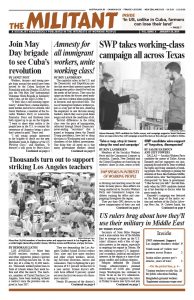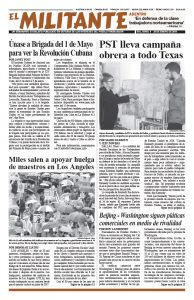Secretary of State Mike Pompeo used a nine-nation tour of the Middle East to attempt to shore up the U.S. rulers’ alliances with a bloc of capitalist powers in the region, especially in targeting the regime in Tehran. He was seeking to protect U.S. imperialism’s economic, political and military interests in the region at a time of ongoing conflict and shifting relations.
Pompeo defended the Donald Trump administration’s planned withdrawal of 2,000 plus ground troops Washington has stationed in Syria. To do so, the U.S. administration is seeking to organize the rulers in Turkey to move into Syria and join in safeguarding areas still outside the control of the Bashar al-Assad regime and its allies.
It is also searching for a way to prevent a deepening conflict between the Kurdish People’s Protection Units (YPG), Washington’s former ally on the ground, and those same Turkish forces. The Kurdish fighters were decisive for Washington in their war to push back Islamic State, while keeping Assad and his allies in Moscow and Tehran from reconquering the areas being liberated, roughly a quarter of Syria, including its main oil fields.
At home, liberal Democratic Party leaders and other political adherents of the “resistance” against the presidency of Donald Trump have cried bloody murder at the administration’s plan to withdraw. They insist on an indefinite and stepped-up U.S. military garrison in Syria.
War in Syria drags on
The effects of the war in Syria — which has cost the lives of 350,000 Syrians and driven over half the country’s population from their homes — drag on, as does the intervention of Washington, Moscow, Tehran, Ankara and other regional capitalist powers.
Many Syrian refugees in Lebanon were left to fend for themselves in flooded camps following severe winter storms Jan. 6, which left sewage seeping into tents and destroyed meager food supplies.
The Syrian regime maintains a tight siege around the Al-Rukban refugee camp near Syria’s border with Jordan, where six people died from starvation and a lack of medicine late last year.
The capitalist rulers of rival powers intervening in Syria’s civil war remain indifferent to the deteriorating conditions inflicted on the country’s toiling population.
Washington seeks to withdraw forces
The U.S. government is pressing the Turkish rulers to back off from their threats to assault the YPG. Washington found it expedient to provide the YPG with arms to fight Islamic State. Ankara fears Kurdish rule in YPG-controlled territory will inspire the 15 million Kurds living in Turkey, who have waged a decadeslong struggle against national oppression.
Trump has combined threats to “devastate” the Turkish economy if Ankara assaults the Syrian Kurds with negotiations with Turkish President Recep Tayyip Erdogan over the establishment of a 20-mile “safe zone” in northeast Syria. It would be patrolled by the Turkish army, leaving the YPG in political control over much of the rest of the area.
The bottom line is the administration’s effort to withdraw is on hold. Any move to do so, the Pentagon says, is subject to “ground realities.”
Administration spokespeople stress a withdrawal won’t affect the ability of the U.S. to use military might in the Middle East if they choose to. “The absence of a couple thousand soldiers on the ground in Syria in no way materially diminishes the capacity of the United States of America and our amazing Armed Forces to deliver American power to accomplish our objectives anywhere in the world,” Pompeo said Jan. 13.
In a speech at American University in Cairo Jan. 10, Pompeo said Washington and its allies are determined to “expel every last Iranian boot” from Syria. He said this remains Washington’s strategic mission, and the withdrawal from Syria is just a “tactical change.”
Washington’s deployment of warplanes, bombs, missiles, the navy’s Fifth Fleet, and tens of thousands of ground troops in bases around the Mideast is far and away the most powerful there.
Pompeo said there will be no U.S. reconstruction aid to Syria as long as Assad allows Tehran’s forces to stay in the country. He added Washington backs the Israeli rulers’ continual airstrikes on these forces. The U.S. government’s sanctions against Tehran continue to constrict the Iranian economy, weighing most heavily on working people there.
The U.S. rulers have intervened continuously in the Middle East over decades, convinced that the fall of the Soviet Union in 1991 meant they had “won” the Cold War and could do as they pleased with no consequences.
But they were wrong. They’ve been enmeshed for decades in wars in Iraq and Syria, as well as in Afghanistan, and conflicts elsewhere in the region, unable to either establish stability for their interests or to get out.

